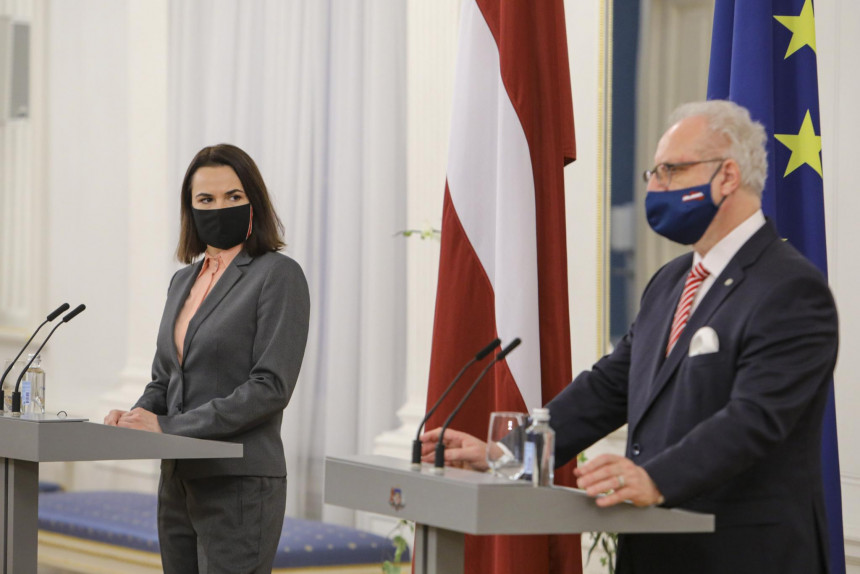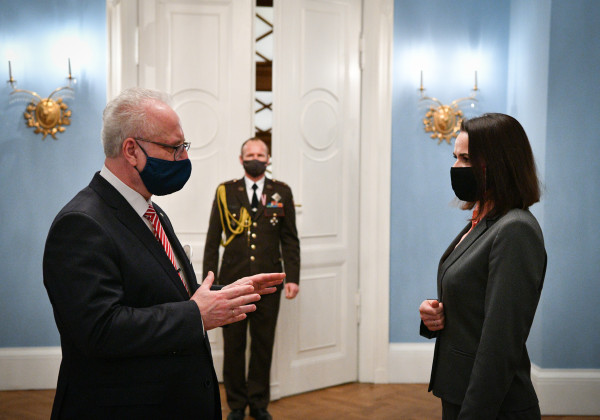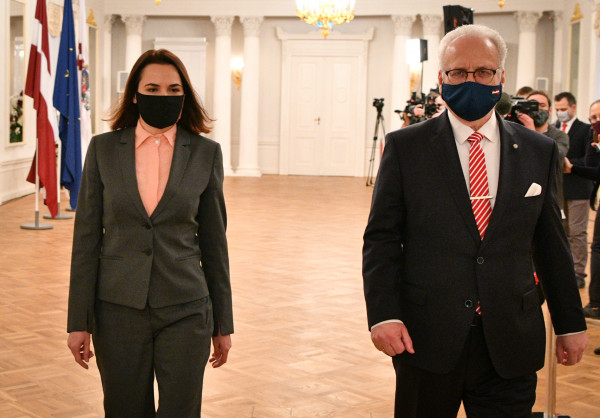Tikhanovskaya is welcomed to Riga with a powerful governmental reception

The symbolic leader of Belarus - Svetlana Tikhanovskaya was already in Riga in September, but at that time she met only with the Minister of Foreign Affairs Edgars Rinkēvičs. This time her visit is much more significant. She met with both President Egils Levits and Prime Minister Krišjānis Kariņš.
What has changed during this time? Before answering this question, some details need to be clarified. Firstly, how to introduce her, and secondly, how to use her name more correctly. Let's start with the second question. It is customary to call her Svetlana Tikhanovskaya, which corresponds to the Russian transcription of her name and surname. According to the Belarusian pronunciation, she should be called Sviatlana Tsikhanouskaya, but humans are creatures of habit, as we all know.
The situation is even more complicated with her socio-political status. She is sometimes called the leader of the Belarusian opposition, but this notation is not quite correct, as opposition means standing against the official majority power that does not exist in Belarus at all. Alexander Lukashenko, a citizen in power, is no longer the president or a representative of a majority. He, even with all the enormous administrative resources (or perhaps because of it), was unable to arrange for himself any believable victory in the presidential elections on 9 August, provable with real ballot papers. Instead, Lukashenko without thinking too much declared his victory with 80% of the vote, which even his strongest supporters (if there are any) do not believe. If you have 80%, then you are a leader beloved by the whole nation, not a character who runs with a machine gun in his hand in the courtyard of his castle, which is protected from the nation by a triple chain of OMONs.
Tikhanovskaya is sometimes called the candidate who won the presidential election because she won convincingly in all the polling stations (there were several hundred) where the votes were actually counted. Although there is ample evidence, including audio and video recordings, of Tikhanovskaya's real victory and Lukashenko's defeat in the election, it is not possible to call Tikhanovskaya an "elected president." She herself does not claim such a title and calls for new, democratic elections in which the votes are counted fairly.

Tikhanovskaya would now be best seen as a symbol of popular resistance. As a person who represents the people of Belarus internationally in a time when a tyrant has usurped the country. It was with this status that she was welcomed to Riga, and since September her status has become more and more convincing.
In Belarus itself, on the eve of Tikhanovskaya's visit, the situation worsened again. Last Sunday, the regime seemed to have managed to suppress protests, at least for a while. For the first time since August, Lukashenko's "punishment units" managed to split rows of protesters and prevent them from forming a single, large column of demonstrators. It seemed that the constant repression had tired the people and that Lukashenko was getting the upper hand. But an evil joke was played on him by the very genie that he himself let out of the bottle. Namely, a machine of violence going in free flow without any control, which did its dirty work quite predictably.
On Wednesday evening, their local Tonton Macoute equivalent unit arrived in one of the courtyards of Minsk's residential districts to remove the white-red-white Belarusian national flag, which is considered a symbol of resistance in the eyes of the regime. To express his dissatisfaction with what was happening in the yard, Roman Bondarenko, a 31-year-old former special task force soldier, went out and asked out loud: What are you doing? This innocent question was enough for the men in black to pile on top of him and start punishing him. Bondarenko's beating was filmed on a mobile phone and spread on social networks. However, similar beatings are commonplace in Belarus today, which no longer worries anyone much. Only this time everything turned out more tragically. The man was taken to the police station, where the beating continued until an ambulance had to be called. But it was too late. Bondarenko underwent major surgery, after which doctors rated his chances of survival as very low. Bondarenko died on Thursday afternoon.

It is not yet possible to say what the consequences of this tragic event will be, but there are a number of things that are very unfavorable to the regime. Firstly, this is the first death in which violence was clearly recorded on video and the people were able to follow what was happening in real time. Let me remind you that the first victim, Alexander Taraikovsky, who was shot dead on the night of August 10, was first portrayed by the regime as a terrorist who allegedly died when his own grenade exploded in his hands. The video, which showed that Taraikovsky was shot in a direct hit and did not have any grenades in his hand, appeared only after several days, so the regime managed to mitigate the unpleasant effects of this tragedy. Other fatal events were not emotional enough.
This time, the victim is a very sympathetic guy, whose beating is clearly visible in the video, and his health condition could be monitored for almost 24 hours, during which time the emotional experience only increased. It is no wonder that the wave of protest, which seemed to be fading, has been restored to its former strength. EU High Representative Josep Borrell also strongly condemned Bondarenko's murder and announced that additional sanctions on the guilty officials would be readied.
Of course, this does not mean that there has been a break in the opposition between the regime and the people. It is very likely that Lukashenko's snipers will continue to drive the protest deep underground as the terror continues, but it can already be said that this time Lukashenko has been tainted with blood more than ever before. This does not mean that his crimes have been less bloody in the past. Only never before have they been so clearly fixed. Just like in a movie. Now he and his regime no longer even have a theoretical way back. A compromise is no longer possible, and it is already taking the situation in Belarus to the next level of violence and opposition. We, as Belarus' closest neighbors, must also take this into account.
